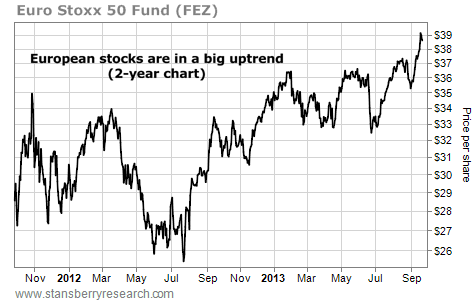| Home | About Us | Resources | Archive | Free Reports | Market Window |
|
Editor's note: Our colleague and friend Dan Ferris is one of the best business analysts we know. And this week, he's going to share his "five financial clues" for finding great investments… These are the same clues he's used to help his Extreme Value readers make hundreds-of-percent gains. Whether you're an experienced investor or just getting started, these could be some of the most important ideas you read this year.
This Simple Number Tells You If the Shares You Hold are WorthlessBy
Tuesday, September 24, 2013
Over the past decade, I've received dozens of e-mails from folks who write in to ask me:
"Dan, how do you analyze the stocks you recommend? Is there a secret to finding great investments?"
Well, it's a difficult process... but the answer is yes.
If you know what to look for, there's a definite secret to finding what we call "slam dunk" great investments. The kind of stocks that could make you a fortune – with very little risk. Often, these are such good investments, you can pass your stake on to your children or grandchildren.
It all boils down to what I call "The Five Financial Clues." And today, I'm going to share the first clue I look for…
This clue led me to stocks like Prestige Brands Holdings (PBH) – currently up 422% since I recommended it in my Extreme Value newsletter. Or Constellation Brands (STZ) – up 169%.
And right now, it's tipping me off to another great opportunity…
So what's the first financial clue I look for? Simply put, I want a business that gushes with free cash flow.
Free cash flow is all the excess cash profit left over after a business pays all its expenses and taxes and after it reinvests enough cash to maintain and grow the business.
When you buy a stock in your brokerage account, you're buying a piece of a business. It's not a debt interest, and it's not a preferred stock interest.
It's equity.
And equity is a "residual claim" on the earnings of a business. "Residual" just means the equity holder doesn't get paid until everybody else gets paid.
This is really important.
You see, there's nothing left over for equity holders until secured creditors, salary and wage earners, taxes, trade creditors, unsecured creditors, and preferred stock holders all get paid.
Only after all these obligations are met can you, the equity holder, expect your shares to be worth anything.
In fact, excess cash flows are the one thing that give your stock nearly all of its value.
It makes sense, right? This is what makes a business valuable: the ability to generate lots of extra cash. Without excess cash, your shares are worthless.
Think of it a different way...
Suppose you own a business. You want that business to pay you as much cash as possible during the time you own it. And that's true whether you own 100% of a business you run yourself – or whether you own just one share of a multibillion-dollar company.
Free cash flow is easy to find.
All you do is go to the "cash flow" section of a company's financial statements and subtract "capital expenditures" from "operating cash flow."
If you want to be nitpicky, sometimes operating cash flow is called "cash from operations" or "net cash from operations." And sometimes, capital expenditures are called "additions to property and equipment" or something similar.
Take software giant Microsoft (MSFT), for example.
Here's how I calculate Microsoft's free cash flow: Net cash from operations is $28.8 billion. Let's subtract $4.3 billion for additions to property and equipment. This equals $24.5 billion.
That's a lot of free cash flow.
Very few businesses generate as much free cash flow as Microsoft.
What's interesting is most people have no idea how important this financial clue is, so they're unable to understand what an amazingly good business Microsoft really is right now, despite all the negative headlines about it.
To sum up:
The thing is, while a company may generate lots of cash, it might not use it to benefit shareholders. I'll cover that idea tomorrow. Good investing,
Dan Ferris
Further Reading:
"In simple terms, a share of stock represents a share of an actual business," Dan says. And the majority of investors would make a lot more money if they learned to approach stocks the way they'd approach ownership in a business. Find out how to start "valuing a stock as a private business owner would" here.
Dan says using free cash flow to value a business will give you the ultimate confidence that you're going to make a profit. "It takes out much of the uncertainty about your financial future. And it eliminates the guesswork most investors rely upon to pick stocks."
Market NotesTHE LATEST PROOF OF THE GLOBAL BERNANKE ASSET BUBBLE European stocks are booming... even though Europe's economy is stuck in neutral.
Over the years, Steve has detailed how the Fed's commitment to keeping interest rates low has driven U.S. asset prices higher. Stocks and real estate have soared. And last year, the Bernanke Asset Bubble became a global event.
Today, asset prices are soaring in one of the most "unlikely" places – Europe. Europe's economy is in shambles. The 17-nation eurozone is on track for its second straight year of negative GDP growth. And unemployment rates are still stuck above 25% in many countries. But investors don't seem to care. Money is flowing into Europe, driving up stock prices.
For proof, we look at the SPDR Euro Stoxx 50 Fund (FEZ). FEZ consists of the largest multi-national blue-chip companies in Europe. And last week, it touched its highest level in two years. Despite Europe's crummy economy, its stock prices are in a big uptrend… It's the latest proof the Bernanke Asset Bubble has gone global.
 |
In The Daily Crux
Recent Articles
|


